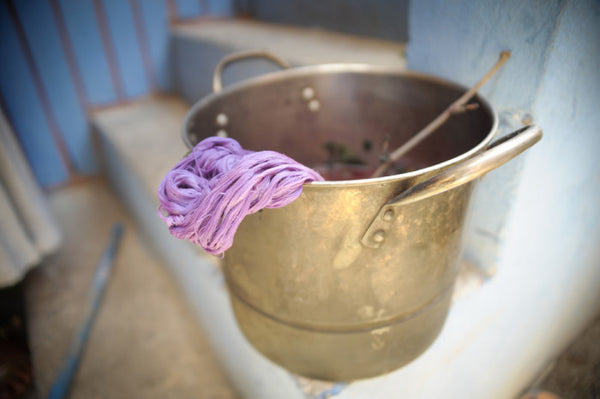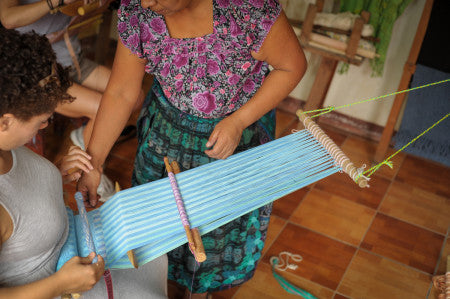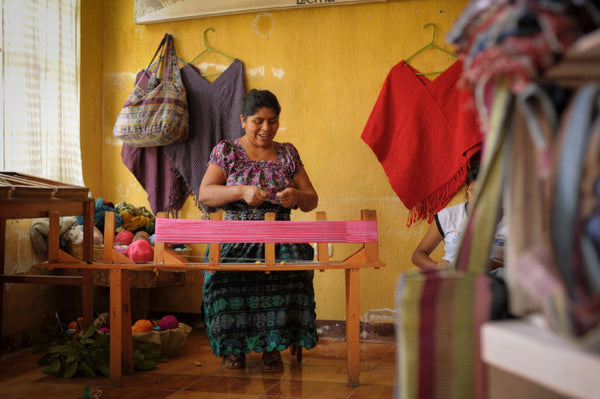Keeping It All in the Family
Recently, the Hiptipico crew had the privilege of visiting our long-term artisan partner, Rosalinda, the founder of the LEMA Association in San Juan la Laguna. LEMA is a female artisan cooperative using only plants native to the area to dye cotton prior to weaving. Unlike the majority of Maya embroidery which uses imported string and colors derived from chemicals, LEMA prides itself on using organic products. On their website, LEMA emphasizes, “every garment we have made has a story and is especially crafted to achieve complete customer satisfaction.” To dye their fabrics, the LEMA women use an array of natural tints found in plant leaves, barks, vegetables and fruits like coconut shells, pepper, and achiote. During our lesson, Rosa gave us the most interactive demonstration of this natural dye tinting process coming out of the Tz'utujil tradition.
For those of you who weren't able to attend (so sorry for ya – but you can follow all of our adventures in real time on Snapchat @hiptipico), we learned that the tinting process has been kept alive through the generations by the women of Rosa’s community, including her mother and her grandmother before her. The LEMA group officially came together in 1999 when Rosa joined together the women in her community who were struggling to make ends meet. At that time, tourists never explored San Juan, one of the tiniest villages on Lake Atitlan. And of course, local job opportunities were scarce. Rosa decided to harness her ancestors’ talents and create new innovative designs using this ancient technique. LEMA women were trailblazers in their village of San Juan and this idea of using these customary tinting practices as a means of income in the face of severe financial hardship expanded to other women’s groups. Armed with this background information, I was keen to meet the woman central to the story and see her in action.
We sat on the concrete steps in Rosa’s garden eagerly watching while she prepped the pot of boiling water atop burning logs. She began by separating fragrant leaves of the sacatinta, which she explained were responsible for creating textiles with a bluish-purple tint. Rosa added small bunches of leaves to the pot of water as she spoke to us, gauging the firmness of the leaves from time to time. Now and again, her daughter and granddaughter would pop outside to ask her a question from inside the storefront. LEMA is a fabric lover’s veritable paradise, inundating the tactile senses with different textures of items like beach bags, scarves, and potholders before she can fully absorb the range of breathtaking colors that accompany them.
LEMA's primary strength clearly lies in not only the expertise exhibited by Rosa and her daughters, but in the strong family values present in every item produced. And in this family, tradition is highly valued. In the face of relentless historical discrimination against indigenous peoples that has lasting effects today, maintaining Maya traditions and language while also adopting modern practices is an incredibly difficult feat in Guatemala. The natural byproducts of assimilation have left younger generations of Maya peoples unable to fluently speak their mother tongue or comprehend their indigenous language in favor of the more widely spoken Spanish which is preferred in the job market and education systems. Likewise, younger Tz’utujil women are unacquainted with the weaving skills that are so proudly demonstrated by their elders. For this reason exactly, Rosa has not only taught her own daughters how to weave using the back strap loom but also offers classes to anyone interested in learning. Rosa helped me – frequently – while I tried my hand at performing the unfamiliar process of weaving a scarf. As I anxiously checked each step to ensure I wasn’t ruining the beautiful garment and making even more work for the women, I was truly touched to realize how generous was this gesture; Rosa and her daughters were including me in such an intimate, time-honored practice as if I were one of their own. I hope to feel this humble and grateful for many, many years to come.
During the tinting, we were excited to watch Rosa transform the transparent pot of water to a deep, opaque plum from lush green leaves. Even more fascinating and heartwarming were the stories she shared about her daughters, Yeyme and Tey. The sisters travel several hours by bus and small, rocky boats called lanchas to neighboring towns for their schooling. Rosa’s parental concern for her daughters to experience quality education and thrive rang clear despite any language barriers. In her parenting style, Rosa perfects the art of embracing traditional practices and customs while simultaneously allowing modern concepts of freedom and independence necessary to ensure her daughters a life free from poverty.
The Hiptipico girls agreed that our favorite anecdotes were about her husband Ruben, who she fondly describes as her "right hand man." When Rosa began LEMA, she remembers that her husband fully backed her, even taking time during his own fieldwork to scout leaves to produce interesting new colors. Ruben would excitedly display his findings to her by rubbing the leaves on his white work shirt. Ruben’s unswerving support is a rare find in Guatemala especially, where gender inequalities are seen often in the ways women are subordinated in public and domestic matters. In communities plagued by poverty and subsequent alcoholism and domestic violence, the case of Rosa’s ability to support her family with her husband’s blessing and practical help is a case that other Guatemalan women of her social standing are likely unable to conceive of.
Rosa and Ruben serve an example of a truly loving, supportive pair in marriage and business - to which all of us Hiptipico girls swooned. Seriously. #Relationshipgoals
To shop and support Rosa, click ⇢here⇠
≫ Follow along LIVE from Guatemala and browse more of our fair trade products on Instagram (@hiptipico).
♡ See our female founder's daily posts featuring other ethical fashion brands and collaborations (@alyssaya).
≫ Be sure to like Hiptipico on Facebook for global news, travel and women's empowerment.












